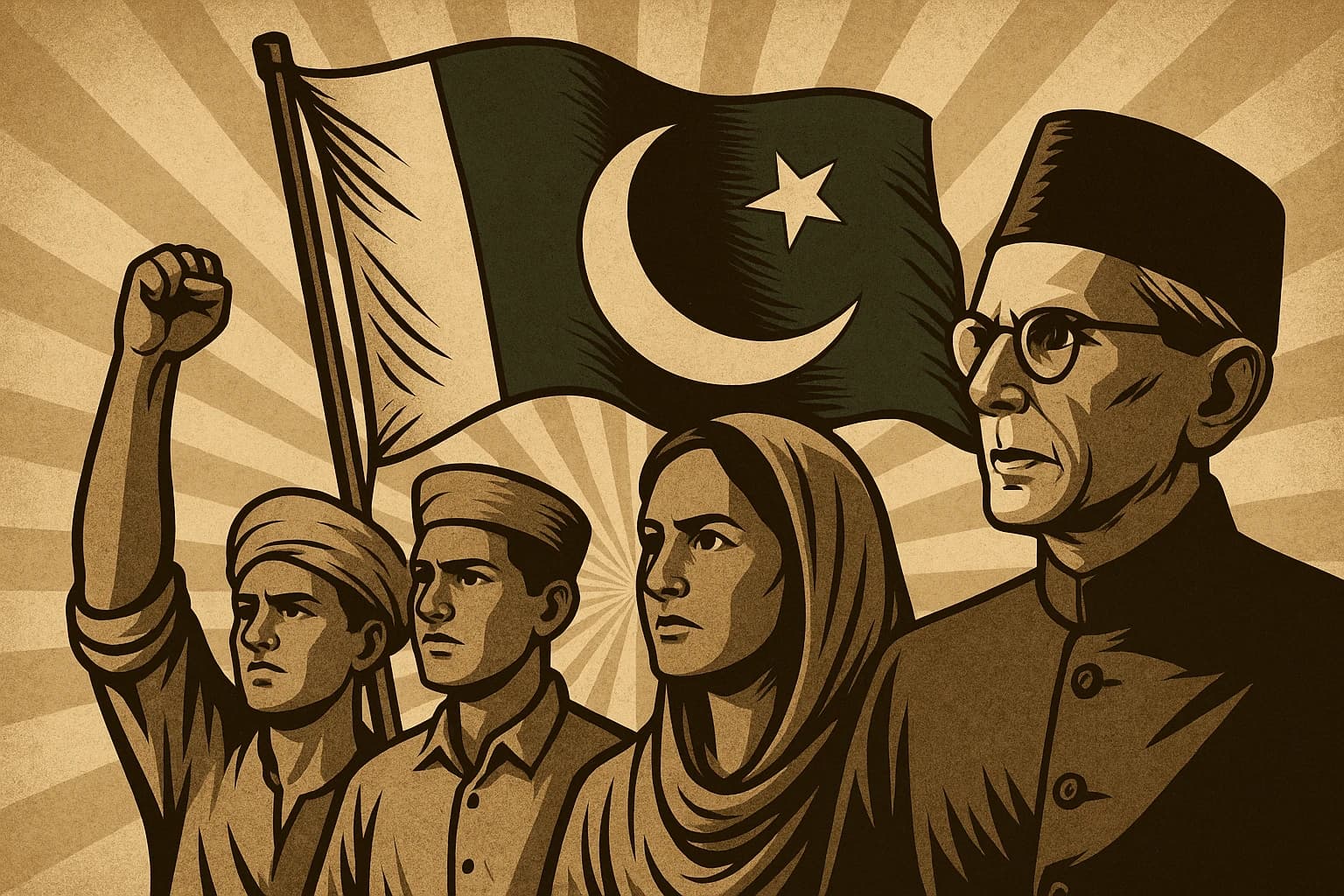© 2025 Roz UpdatesbyTETRA SEVEN

* All product/brand names, logos, and trademarks are property of their respective owners.
When we talk about the Pakistan independence movement, the names of Quaid-e-Azam Muhammad Ali Jinnah, Allama Iqbal, and Liaquat Ali Khan often dominate the conversation. Their leadership and vision undoubtedly shaped the destiny of the nation but they were not alone. Behind the scenes, away from the spotlight of history books, countless men and women worked tirelessly, sacrificing their safety, comfort, and even their lives to see the dream of Pakistan come true.
These unsung heroes of Pakistan’s independence movement came from every corner of the subcontinent. They were political leaders who rallied their communities, women who broke cultural barriers to join the struggle, students who marched fearlessly, and everyday citizens whose quiet acts of courage made a monumental difference. Many of them never received the recognition they deserved, yet their stories are woven into the fabric of our freedom.
In this blog, we will take you on a journey beyond the well-known figures, shining a light on the forgotten names who played pivotal roles in the independence struggle. You’ll discover political reformers from Balochistan and Hyderabad Deccan, teenage girls who risked their lives to hoist the flag, and railway workers who became silent revolutionaries. By the end, you’ll see that Pakistan’s freedom was not the work of a few it was the collective triumph of thousands of determined souls.
It’s time to remember them. It’s time to tell their stories. And it’s time to give them the place they deserve in the nation’s history.
Allama Inayatullah Mashriqi was a visionary leader, mathematician, and political reformer who believed in discipline, self-reliance, and national unity. In 1931, he founded the Khaksar Movement, a volunteer organization whose members dressed in simple khaki uniforms and carried spades as symbols of service and humility. The movement’s goal was to prepare the Muslim community for self-governance through social reform, military style discipline, and education. While Mashriqi never received the same level of fame as Jinnah or Iqbal, his grassroots mobilization inspired thousands, especially among the working class, to stand up for their rights.
Maulana Hasrat Mohani is often remembered for his romantic Urdu poetry, but few realize he was one of the earliest voices to demand complete independence from British rule. As early as 1921, he openly used the slogan “Inquilab Zindabad” (Long Live the Revolution), which became a rallying cry for freedom fighters across the subcontinent. Mohani was imprisoned multiple times for his outspoken views and spent much of his life under British surveillance. Despite this, he continued to inspire through both his political activism and literary contributions, bridging the worlds of art and resistance.
A charismatic orator and respected statesman, Nawab Bahadur Yar Jung played a significant role in uniting Muslims in the princely state of Hyderabad Deccan. As the president of the Majlis-e-Ittehad-ul-Muslimeen, he advocated for Muslim political rights and strongly supported the Pakistan Resolution of 1940. His speeches stirred emotions and inspired political awareness among Muslims in South India, a region often overlooked in the mainstream narrative of the independence movement. His sudden death in 1944 was a huge loss to the cause, but his legacy of courage and conviction lived on in the movement’s momentum.
Known as the “Gandhi of Balochistan,” Abdul Samad Khan Achakzai was a political leader, writer, and reformer who campaigned for democracy, education, and the rights of the people of Balochistan. He believed that independence for Pakistan must also mean freedom from internal injustices like illiteracy, tribal exploitation, and political oppression. His insistence on constitutional rights and his work to uplift marginalized communities made him a true hero of the independence struggle even though his contributions remain largely absent from history textbooks.
When we talk about Pakistan’s freedom struggle, women’s contributions are often condensed into a few lines yet their courage was monumental. These women defied societal expectations, stepped into the public arena, and risked their safety to play their part in the independence movement. Their sacrifices remind us that Pakistan’s story is not just about political speeches and diplomatic negotiations it’s also about silent acts of defiance and open challenges to the colonial power.
In 1947, at just 14 years old, Fatima Sughra became a symbol of youthful bravery. During a political protest in Lahore, she climbed the flagpole at the Government Secretariat, removed the Union Jack, and hoisted the Muslim League flag in its place. This act was not only a direct challenge to British authority but also a moment that electrified the independence movement. Her courage inspired countless young Pakistanis to join the struggle.
As the wife of Pakistan’s first Prime Minister, Begum Ra’ana Liaquat Ali Khan could have lived a life of comfort and diplomacy instead, she became one of the movement’s most active leaders. A tireless organizer, she founded the All Pakistan Women’s Association (APWA) and mobilized women to participate in political rallies, relief work, and educational initiatives. Her speeches emphasized that Pakistan’s independence must also mean equal rights and opportunities for women.
Lady Abdullah Haroon, wife of the prominent businessman and politician Abdullah Haroon, used her wealth and influence to support the independence movement. She was a key fundraiser for the Muslim League and sponsored educational programs for Muslim girls at a time when female education was rare. Her financial contributions ensured that political campaigns and community initiatives had the resources they needed to reach the masses.
Before she became the “Queen of Melody” in Pakistan, Madam Noor Jehan was already using her voice to inspire patriotism. During the independence movement, she performed in stage shows, sang patriotic songs, and participated in cultural programs that boosted morale among Muslims. Her artistic influence helped popularize the ideals of freedom and unity, reaching audiences that political speeches often could not.
While political leaders and public figures steered the direction of the Pakistan movement, it was the ordinary citizens students, workers, and local community members who carried its spirit to every street and village. These unsung heroes often risked their lives without the promise of recognition or reward. Their stories remind us that the independence struggle was not just fought in legislative halls, but in classrooms, railway stations, printing presses, and dusty village courtyards.
The students of Aligarh Muslim University and various colleges in Lahore were among the most vocal supporters of the Pakistan Resolution. They organized rallies, published pamphlets, and even went door-to-door to raise political awareness. Many faced expulsion, imprisonment, or violence at the hands of the authorities. Yet their unwavering spirit kept the momentum of the independence movement alive, proving that youth can be the backbone of any revolution.
In an era when railways were the lifeline of communication and transport, railway workers played a crucial but dangerous role in the Pakistan movement. They secretly transported supplies, distributed Muslim League literature, and passed messages between leaders in different cities. Many worked under constant surveillance from British officers and risked losing their jobs or worse imprisonment if caught.
In rural Pakistan, where literacy rates were low, political messages were often spread through word of mouth. Village elders became the key messengers, gathering communities in mosques or under large banyan trees to explain the Pakistan Resolution and its importance. Their influence mobilized hundreds of thousands of rural voters, ensuring that the independence movement was not just an urban phenomenon.
Before independence, several underground printing presses operated in secrecy to produce pro-Pakistan newspapers, pamphlets, and posters. Journalists risked arrest and confiscation of their equipment, yet they persisted in spreading the message of freedom. These publications helped counter British propaganda, inspiring more people to join the movement.
Allama Inayatullah Mashriqi – Founded the Khaksar Movement to promote discipline, unity, and self-reliance among Muslims.
Maulana Hasrat Mohani – Poet and revolutionary who first demanded complete independence.
Nawab Bahadur Yar Jung – Powerful voice for Muslims in Hyderabad Deccan.
Abdul Samad Khan Achakzai – Reform leader advocating democracy and education in Balochistan.
Fatima Sughra – 14-year-old who replaced the Union Jack with the Muslim League flag in Lahore.
Begum Ra’ana Liaquat Ali Khan – Mobilized women to actively participate in the independence movement.
Lady Abdullah Haroon – Funded political campaigns and championed women’s education.
Madam Noor Jehan – Used her voice and art to inspire patriotism.
Student Movements – Aligarh and Lahore students organized rallies and spread awareness.
Railway Workers – Transported supplies and information under British surveillance.
Village Elders – Mobilized rural communities for political participation.
Underground Journalists – Operated secret presses to spread the message of freedom.
The story of Pakistan’s independence is far richer and deeper than the few names that dominate our history books. Behind the towering figures of Jinnah, Iqbal, and Liaquat Ali Khan were countless men and women political reformers, fearless students, compassionate philanthropists, dedicated workers, and creative artists who all played their part in shaping the destiny of this nation.
These unsung heroes did not work for fame or personal gain. Many lived and died without ever seeing their names printed in history, yet their sacrifices were woven into the very fabric of Pakistan’s freedom. From the disciplined ranks of the Khaksar Movement to the teenage courage of Fatima Sughra, from the selfless railway workers to the underground journalists, each contributed a vital piece to the larger puzzle of independence.
Remembering them is not just about honoring the past it’s about inspiring the present. Their stories remind us that great change is never the work of one person alone; it is the result of countless ordinary people doing extraordinary things. As we celebrate Pakistan’s independence each year, let’s take a moment to honor every hand that raised a flag, printed a pamphlet, spoke a word of resistance, or took a stand against injustice.
The future of Pakistan depends on how well we carry forward their spirit the spirit of unity, resilience, and unwavering belief in the dream of a better tomorrow.

26 November 2025
No comments yet. Be the first to comment!